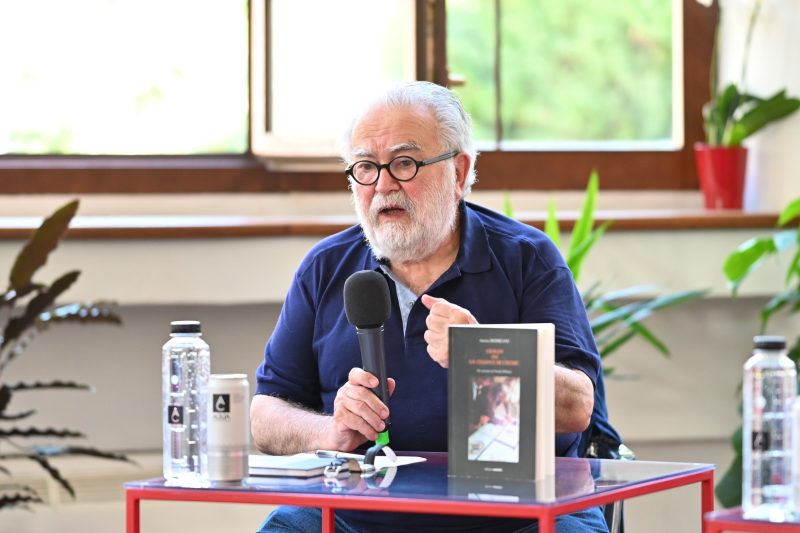Written by Constantin Necula
Amongst those who have laid the foundations of a distinctive culture of the Sibiu International Theatre Festival, I believe that Mr. George Banu deserves a most special place in the limelight. A mind most noble, like a heavenly wine, running through the veins of the artistic confessions of Sibiu, year after year, like an explosive sunrise. A noble duke of the spoken word and of the incredible intuition of Beauty. An intensive course in the understanding of the world. On the benches in Cetății Park, where he had become a star long before Heaven claimed his stardust, or standing in front of the Humanitas bookshops windows, carried away by an unseen cursor within the mysterious distribution of genius seeking silence, sipping thirstily from the deepest silence, an unquestionable value, clever and with the liveliest humor even during conferences, George Banu was a firm believer in everything Sibiu theatre stands for.
A Man gloriously capitalized, George would go unnoticed and simultaneously sip from the divine atmosphere in the grand Cathedral with the serenity of a child plundering an overripe cherry tree. My feeling, which is not only confined to the past few years, was that he was searching to quench his terrible thirst for Beauty and had finally found its well. We’ve spent moments that turned into hours, without any futile philosophizing, we’ve walked those paths of a Garden of Eden which – he admitted it, with a childish smirk – he had forgotten about. That he had spent years upon years hiding from.
Maybe it would be worth recording our long night-time conversations on the bench in the Cathedral yard. But I have forgotten the words; the only thing that still remains is the boundless joy that lit up his face when he first heard about Christ-The Forgiver. It was for this that he was sneaking into the Cathedral conferences or discreetly questioned the time of speech during our bookish meetings. Lines of words. Whispered verses or my discovery of the universe of modern theatre, the connection between the texts of the Scripture in moments of bewilderment or joy, or listening to Mass from beyond the rain clouds are inner landscapes which made our friendship seem rather like an exercise in Resurrection. As it should be.

His death has left me empty hearted. On my computer I still have his letter of recommendation for my position as a university professor. Signed with the most disarming simplicity: George Banu, member of the French Academy. I was profoundly moved and my gratitude seems insufficient even now or especially now, when I look upon his departure with nostalgia. With Death unexpectedly knocking at his door, he could not have told it no. He was determined to go without the stigma of incapacity and it is my belief that God granted him this privilege he was hoping for. To be alive when dying – a silly but obviously participative joke.
He who had always been a man of forgiveness met, I am certain of it, with Christ the Forgiver in order to pass through the gates of merciless death. I often told him that meeting with death would be a huge question mark for him. Drawn with a light hand, in charcoal, on a page of silk. The silk of his famous scarves or of his golden handkerchief that he used to wipe the nose of a little girl who had been hit by a curmudgeon in the Large Square. His eyes had become large and his intervention – the one of a dreamer – seemed to be an incredible impact between the world and his power of loving.
June is coming and along with it the Festival. George Banu allowed himself to be hidden. He will pass amongst us, I assure you, with his imprescriptible dignity. Lightly, carrying with him the delicious perfume of cranberries from Heaven. And we shall leave our pride aside and we shall say, lowering our gaze, step aside, Sir George, Knight of High Theatre is passing. And he shall smile uneasily. He cannot tell us that he is waiting for us, but his eyes will deliver the message. As they always do.


